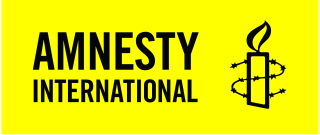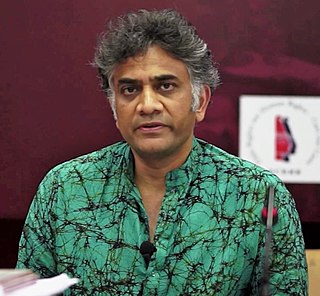Related Research Articles

Human rights in Uzbekistan have been described as "abysmal" by Human Rights Watch, and the country has received heavy criticism from the UK and the US for alleged arbitrary arrests, religious persecution and torture employed by the government on a regional and national level. Amnesty International stated that freedom of expression, association, and peaceful assembly continue to be restricted, and that relations between gay men are illegal.

Indira Jaising is an Indian lawyer and activist. Jaising also runs Lawyers' Collective, a non-governmental organization (NGO), the license of which was permanently cancelled by the Home Ministry for alleged violations of the Foreign Contribution Regulation Act in 2019. The Bombay High Court later passed an order to de-freeze NGO's domestic accounts. The case is ongoing in the Supreme Court of India.

Harsh Mander is an Indian author, columnist, researcher, teacher, and social activist who started the Karwan-e-Mohabbat campaign in solidarity with the victims of communal or religiously motivated violence. He is the Director of the Centre for Equity Studies, a research organisation based in New Delhi. He also served as Special Commissioner to the Supreme Court of India in the Right to Food Campaign and was a member of the National Advisory Council of the Government of India, set up under the UPA government.

The Sahrawi Association of Victims of Grave Violations of Human Rights Committed by the Moroccan State, or ASVDH, is a Sahrawi human rights organization in the Moroccan-occupied areas of Western Sahara.
Vedanta Resources Limited is a diversified mining company headquartered in London, United Kingdom. It is the largest mining and non-ferrous metals company in India and has mining operations in Australia and Zambia and oil and gas operations in three countries. Its main products are Zinc, Lead, Silver, Oil & Gas, Iron Ore, Steel, Aluminium and Power. It has also developed commercial power stations in India in Odisha and Punjab.

The Indian Revenue Service, often abbreviated as IRS, is an Indian government agency that is primarily responsible for collecting and administering direct and indirect taxes. As a central civil service under Group A of the executive branch of the Government of India, it functions under the Department of Revenue of the Ministry of Finance and is under the administrative direction of the Revenue Secretary and the ministerial command of the Minister of Finance.
People's Union for Civil Liberties (PUCL) is a human rights body formed in India in 1976 by Jayaprakash Narayan, as the People's Union for Civil Liberties and Democratic Rights (PUCLDR).

Binayak Sen is a paediatrician, and public health specialist. He is the national Vice-President of the People's Union for Civil Liberties (PUCL). He is the recipient of several awards including the Jonathan Mann Award, the Gwangju Prize for Human Rights, and the Gandhi International Peace Award. He has been convicted of sedition by a local Court in India which was later upheld by the High Court of Chhattisgarh. He was subsequently granted bail by the Supreme Court of India on appeal. He is a member of the policy group for Police Reforms of Aam Aadmi Party.

Unlawful Activities (Prevention) Act is an Indian law aimed at prevention of unlawful activities associations in India. Its main objective was to make powers available for dealing with activities directed against the integrity and sovereignty of India. The most recent amendment of the law, the Unlawful Activities (Prevention) Amendment Act, 2019 has made it possible for the Union Government to designate individuals as terrorists without following any formal judicial process. UAPA is also known as the "Anti-terror law".

Amnesty International is an international non-governmental organisation focused on human rights, with its headquarters in the United Kingdom. The organization says it has more than ten million members and supporters around the world. The stated mission of the organization is to campaign for "a world in which every person enjoys all of the human rights enshrined in the Universal Declaration of Human Rights and other international human rights instruments." The organization has played a notable role on human rights issues due to its frequent citation in media and by world leaders.

The government of Belarus is criticized for its human rights violations and persecution of non-governmental organisations, independent journalists, national minorities, and opposition politicians. In a testimony to the United States Senate Committee on Foreign Relations, former United States Secretary of State Condoleezza Rice labeled Belarus as one of the world's six "outposts of tyranny". In response, the Belarusian government called the assessment "quite far from reality". During 2020 Belarusian presidential election and protests, the number of political prisoners recognized by Viasna Human Rights Centre rose dramatically to 1062 as of 16 February 2022. Several people died after the use of unlawful and abusive force by law enforcement officials during 2020 protests. According to Amnesty International, the authorities didn't investigate violations during protests but instead harassed those who challenged their version of events. In July 2021, the authorities launched a campaign against the remaining non-governmental organizations, liquidating at least 270 of them by October, including all previously registered human rights organizations in the country.
Lawyers Collective is a non-governmental organization in India which promotes human rights, especially on issues relating to women's rights, HIV, tobacco, LGBT and parliamentary corruption in India. On 1 June 2016, Govt of India suspended the FCRA registration of the NGO for alleged violation of FCRA norms. This revoking of the license was challenged in the Bombay High Court and the case is currently pending. The Central Bureau of Investigation filed a first information report on 13 June 2019 relating to charges of criminal conspiracy, criminal breach of trust, cheating, false statement made in declaration and various sections under the FCRA and Prevention of Corruption (PC) Act 1988.
Human rights abuses in Jammu and Kashmir range from mass killings, enforced disappearances, torture, rape and sexual abuse to political repression and suppression of freedom of speech. The Indian Army, Central Reserve Police Force (CRPF), and Border Security Personnel (BSF) have been accused of committing severe human rights abuses against Kashmiri civilians. According to Seema Kazi, militant groups have also been held responsible for similar crimes, but the vast majority of abuses have been perpetrated by the armed forces of the Indian government.
Human rights abuses in Kashmir have been perpetrated by various belligerents in the territories controlled by both India and Pakistan since the two countries' conflict over the region began with their first war in 1947–1948, shortly after the partition of British India. The organized breaches of fundamental human rights in Kashmir are tied to the contested territorial status of the region, over which India and Pakistan have fought multiple wars. More specifically, the issue pertains to abuses committed in Indian-administered Kashmir and in Pakistani-administered Kashmir.
The National Intelligence Grid or NATGRID is the integrated intelligence master database structure for counter-terrorism purpose connecting databases of various core security agencies under Government of India collecting comprehensive patterns procured from 21 different organizations that can be readily accessed by security agencies round the clock. Its current CEO is Ashish Gupta, IPS. It is reported to be operational since 31 December 2020.
Criticism of Amnesty International includes claims of selection bias, as well as ideology and foreign policy bias against either non-Western countries or Western-supported countries. Various governments criticized by Amnesty International have in turn criticized the organization, complaining about what they assert constituted one-sided reporting.

The Foreign Contribution (regulation) Act, 2010 is an act of the Parliament of India, by the 42nd Act of 2010. It is a consolidating act whose scope is to regulate the acceptance and utilisation of foreign contribution or foreign hospitality by certain individuals or associations or companies and to prohibit acceptance and utilisation of foreign contribution or foreign hospitality for any activities detrimental to the national interest and for matters connected therewith or incidental thereto. It is designed to correct shortfalls in the predecessor act of 1976. The bill received presidential assent on 26 September 2010.

Human rights in Nicaragua refer to personable, political and social rights granted to every human in Nicaragua. Nicaragua derives its understanding of human rights from the Constitution of Nicaragua and international law. Nicaragua is a member state of the United Nations which states that fundamental human rights, such as freedom from slavery and freedom of expression, are enabled for all human beings without discrimination.
Office of the United Nations High Commissioner for Human Rights (OHCHR) released two reports on "the situation of human rights in Indian-Administered Kashmir and Pakistan-Administered Kashmir". The first report released on 14 June 2018 was the first ever issued by the United Nations on human rights in Kashmir. The second update report was released on 8 July 2019. The first report covered June 2016 to April 2018 while the second report covered the period May 2018 to April 2019. In both cases the reactions of Pakistan and India were diametrically opposite.

Aakar Patel is an Indian journalist, activist and author. He served as the head of Amnesty International in India between 2015 and 2019, and currently serves as the chair of the Board of Amnesty International in India. He is the author of Our Hindu Rashtra, an account of majoritarianism in India, and of Price of the Modi Years, which examines the administrative performance of Indian Prime Minister Narendra Modi. In 2014, he authored a translation of Saadat Hasan Manto's Urdu non-fiction Why I Write.
References
- ↑ "Amnesty official alleges organisation's activities halted in India due to freezing of its accounts". The New Indian Express. Retrieved 2020-12-23.
- ↑ Desai, Akshayakumar Ramanlal (1 January 1986). Violation of Democratic Rights in India. Popular Prakashan. ISBN 9780861321308 – via Google Books.
- ↑ "India: Urgent investigation needed after rape suspects 'extrajudicially executed'". www.amnesty.org.uk. Retrieved 2019-12-07.
- ↑ "Amnesty accused of sedition over Kashmir event in Bangalore". BBC News. 16 August 2016.
- ↑ "Amnesty International India's response to complaint filed by ABVP - Amnesty International India". Archived from the original on 2016-10-15.
- ↑ "Amnesty row: Human rights do not stand in the way of India's ambitions". Hindustan Times. 19 August 2016. Retrieved 29 January 2017.
- ↑ "Ex Amnesty India Chief Aakar Patel, Stopped At Airport, Goes To Court". NDTV.com. 6 April 2022. Retrieved 17 April 2022.
- ↑ "Amnesty International offices in India raided by federal police". www.aljazeera.com. Retrieved 2019-12-07.
- ↑ "CBI raids Amnesty India offices in Bengaluru and New Delhi". The Economic Times. 2019-11-16. Retrieved 2019-12-07.
- ↑ "Drop Airport Alert Against Ex Amnesty India Chief, Apologise: Court To CBI". NDTV.com. 7 April 2022. Retrieved 7 April 2022.
- ↑ "Amnesty International to halt India operations". BBC News. 2020-09-29. Retrieved 2020-09-29.
- ↑ "Human Rights cannot be an excuse for defying the law of the land: MHA on Amnesty International". DD News. 2020-09-29. Retrieved 2020-09-29.
- ↑ "ED attaches properties worth ₹17.66 crore of Amnesty International India". 16 February 2021.
- ↑ "Measures by Western Railway: Platforms to play special jingles for women safety". The Indian Express. 30 June 2016.
- ↑ Gandhi, Divya. "65% of prisoners in India are undertrials". The Hindu.
- ↑ "Amnesty International Slams Slow Progress Probe". 6 December 2016.
- ↑ "Amnesty Urges Centre to Speed Up 1984 Massacre Cases".
- ↑ "1984 anti-Sikh riots: Calls for justice in India".
- ↑ "End the Death Penalty - Amnesty International India". Archived from the original on 2016-07-04.
- ↑ Ghosh, Anjali (2009). India's Foreign Policy. Pearson Education India. p. 220. ISBN 9788131710258.
- ↑ Burke, Jason (2015-07-30). "Yakub Memon: India carries out execution over 1993 bomb attacks". The Guardian. ISSN 0261-3077 . Retrieved 2019-12-07.